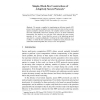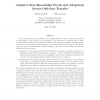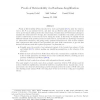TCC
2009
Springer
14 years 5 months ago
2009
Springer
We initiate the study of one-wayness under correlated products. We are interested in identifying necessary and sufficient conditions for a function f and a distribution on inputs ...
TCC
2009
Springer
14 years 5 months ago
2009
Springer
Gordon et al. recently showed that certain (non-trivial) functions can be computed with complete fairness in the two-party setting. Motivated by their results, we initiate a study...
TCC
2009
Springer
14 years 5 months ago
2009
Springer
Abstract. Goldreich (ECCC 2000) proposed a candidate one-way function construction which is parameterized by the choice of a small predicate (over d = O(1) variables) and of a bipa...
TCC
2009
Springer
14 years 5 months ago
2009
Springer
We present a compiler for transforming an oblivious transfer (OT) protocol secure against an adaptive semi-honest adversary into one that is secure against an adaptive malicious ad...
TCC
2009
Springer
14 years 5 months ago
2009
Springer
In the setting of secure computation, a set of parties wish to securely compute some function of their inputs, in the presence of an adversary. The adversary in question may be st...
TCC
2009
Springer
14 years 5 months ago
2009
Springer
Proofs of Retrievability (PoR), introduced by Juels and Kaliski [JK07], allow the client to store a file F on an untrusted server, and later run an efficient audit protocol in whi...
TCC
2009
Springer
14 years 5 months ago
2009
Springer
The concept of witness-hiding suggested by Feige and Shamir is a natural relaxation of zero-knowledge. In this paper we identify languages and distributions for which many known co...
TCC
2009
Springer
14 years 5 months ago
2009
Springer
Predicate encryption is a new encryption paradigm which gives a master secret key owner fine-grained control over access to encrypted data. The master secret key owner can generat...
TCC
2009
Springer
14 years 5 months ago
2009
Springer
Verifiable random functions (VRFs), introduced by Micali, Rabin and Vadhan, are pseudorandom functions in which the owner of the seed produces a public-key that constitutes a commi...
TCC
2009
Springer
14 years 5 months ago
2009
Springer
The known secret-sharing schemes for most access structures are not efficient; even for a one-bit secret the length of the shares in the schemes is 2O(n) , where n is the number of...



